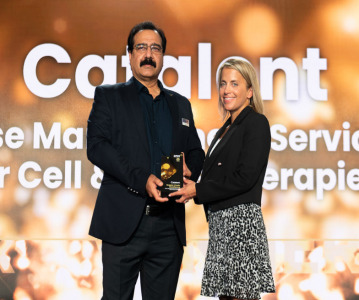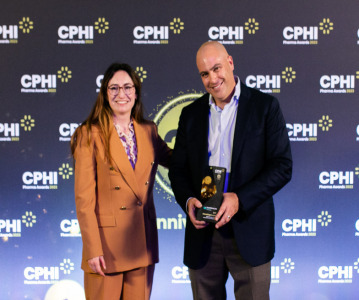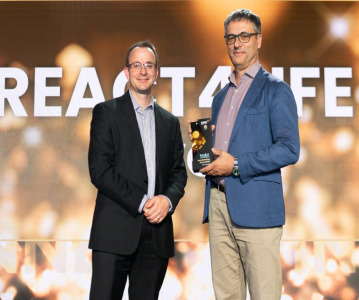CPHI Barcelona Annual Report illuminates industry trends for 2024

The CPHI Annual Survey comes into it’s 7th year to report on the predicted trends for 2024. Over 250 pharma executives were asked 35 questions, with their answers informing the industry landscape for the next year, spanning all major pharma markets.
The 11th edition of the CPHI Annual Report analyses the results of the survey, consolidating the considerations of the experts to predict the most significant trends to watch out for in the year to come.
This year’s report reflects a shift change in future therapies, whereas last year experts were excited about the prospects surrounding psychedelics, this year the industry has honed in on AI as more of a focus with a more imminent impact on the industry, particularly over the next 5 or so years.
The report highlights some important geopolitical factors and, due to events of the past few years, how the pharma supply chain has adapted with moving of manufacturing sites and investments in certain areas to increase resilience. Biotechnology hubs have boomed, along with a change in location of many R&D centres.
Topics the report picks out as of high interest are artificial intelligence, sustainability, bioprocessing, cell & gene therapies and LNPs, discussing aspects of the pharma market in Spain ahead of the country playing host to CPHI this year, and many more key trends.
Artificial intelligence
As an aspect of the tech and pharma industry for several decades, AI has broken ground particularly in sustainability and drug discovery, making it an appealing prospect for investors at the minute, with 24.85% of VCs and investors stating as much according to the annual survey.
Drugs discovered through the use of AI are predicted to come up for approval in the next few years, with big tech and big pharma partnerships becoming a fast dominant feature. These partnerships and categories of development that AI could prove useful in could mean a huge boost in revenue in this area, with a wider impact on the global economy, hence the interest in investment here.
Bikash Chatterjee, President and Chief Science Officer of Pharmatech Associates, a USP company, stated: “A recent study estimated that global GDP could be up 14% higher in 2030 as a result of AI – the equivalent of an additional $15.7 trillion – making it the biggest commercial opportunity in today’s economy.”
The benefits on a more patient-centric level for the incorporation of AI are also clear, with potential uses in cell and gene therapies and clinical trial selection and analyses, adding to it’s appeal for pharma companies looking to improve their offerings in the future.
Sustainability
In all industries, sustainability has beeen reevaluated. In pharma in particular, as one industry that has historically been a big contriubtor to climate change, sustainability has very quickly become recognised as being vastly important. Visibility across the supply chain is considered important by the majority of executives in the field, with each stage being scrutinised with a view to finding more sustainable ways to process. As well as the moral imperative here, there is an economic driver, as by streamlining production, reducing waste, and modifying distribution, companies can also save money, whilst saving the planet.
Spain pharma market
Executives from the survey have identified Spain, and more specifically Barcelona, as an up and coming region, particularly in the biotech/life science start-up market. Spain has seen increased rankings across API manufacturing and biologics manufacturing industries, coming up closely behind world leaders such as the USA, Germany, and Japan.
Raul Martin, Partner at Ysios Capital comments on some of the new activity coming out of Spain: “The historical strength of the country is around small molecules. However, a number of companies have been created around more ‘sophisticated’ modalities including antibodies, cell therapy for regenerative medicine and oncology, gene therapy, RNA therapeutics, oncolytic virus. However, there are also now some initiatives to foster advanced therapies, but they are still too incipient to know if they will consolidate and become a driving force for the sector.”
The report suggests that with further growth in R&D and manufacturing services in Spain, the region could expand and build partnerships more easily in the future.
For more details on the all of the fields covered by the survey and in depth analyses of our expert insights, make sure to download the full annual report here.
Related News
-
News CPHI Pharma Awards 2023 – Supply Chain Excellence Winners: Catalent Case Management Services
After another year of impressive nominations for the CPHI Pharma Awards our winners were announced at CPHI Barcelona in October. In this series of interviews, we speak to the people and teams behind the award-winning projects, concepts, and technologie... -
News CPHI Pharma Awards 2023 – API Development and Innovation Winners: Snapdragon Chemistry, a Cambrex Company
After another year of impressive nominations for the CPHI Pharma Awards our winners were announced at CPHI Barcelona in October. In this series of interviews, we speak to the teams behind the award-winning projects, concepts, and technologies. -
News Navigating the Future: Challenges and Opportunities in Pharma Innovation and Investment – CPHI Barcelona 2023 Roundtable Report
In this comprehensive downloadable report, hear from a range of experts in finance and investment in the pharma industry on what investment trends will be shaping the future of the industry, in Catalonia, and the wider world. -
News CPHI Barcelona 2023: Partnering for Success – Managing Outsourcing Relationships to Optimise Manufacturing Operations
During CPHI Barcelona 2023, insightful content sessions offered attendees the chance to explore trending topics with expert speakers and panellists. Here, we summarise what the pharma industry and supply chain are talking about the most. -
News CPHI Podcast Series: The 2023 Retro – what have we learnt from the past year in pharma?
Welcome to the last episode of 2023! Digital Editor Lucy Chard is joined by her teammates in a special retrospective episode to close out the year. Guests Vivian Xie, Editor for CPHI Online and Tara Dougal, Content Director for Pharma, discuss their hi... -
News CPHI Pharma Awards 2023 – Accelerating Innovation Winners: React4Life
After another year of impressive nominations for the CPHI Pharma Awards our winners were announced at CPHI Barcelona in October. In this series of interviews, we speak to the teams behind the award-winning projects, concepts, and technologies. -
News CPHI Pharma Awards 2023 – Regulatory & Compliance Winners: Lambda Therapeutic Research Ltd.
After another year of impressive nominations for the CPHI Pharma Awards our winners were announced at CPHI Barcelona in October. In this series of interviews, we speak to the teams behind the award-winning projects, concepts, and technologies. -
News CPHI Barcelona 2023: Loading Potential – Artificial Intelligence for Pharma Manufacturing
During CPHI Barcelona 2023, insightful content sessions offered attendees the chance to explore trending topics with expert speakers and panellists. Here, we summarise what the pharma industry and supply chain are talking about the most.
Position your company at the heart of the global Pharma industry with a CPHI Online membership
-
Your products and solutions visible to thousands of visitors within the largest Pharma marketplace
-
Generate high-quality, engaged leads for your business, all year round
-
Promote your business as the industry’s thought-leader by hosting your reports, brochures and videos within your profile
-
Your company’s profile boosted at all participating CPHI events
-
An easy-to-use platform with a detailed dashboard showing your leads and performance







.png)